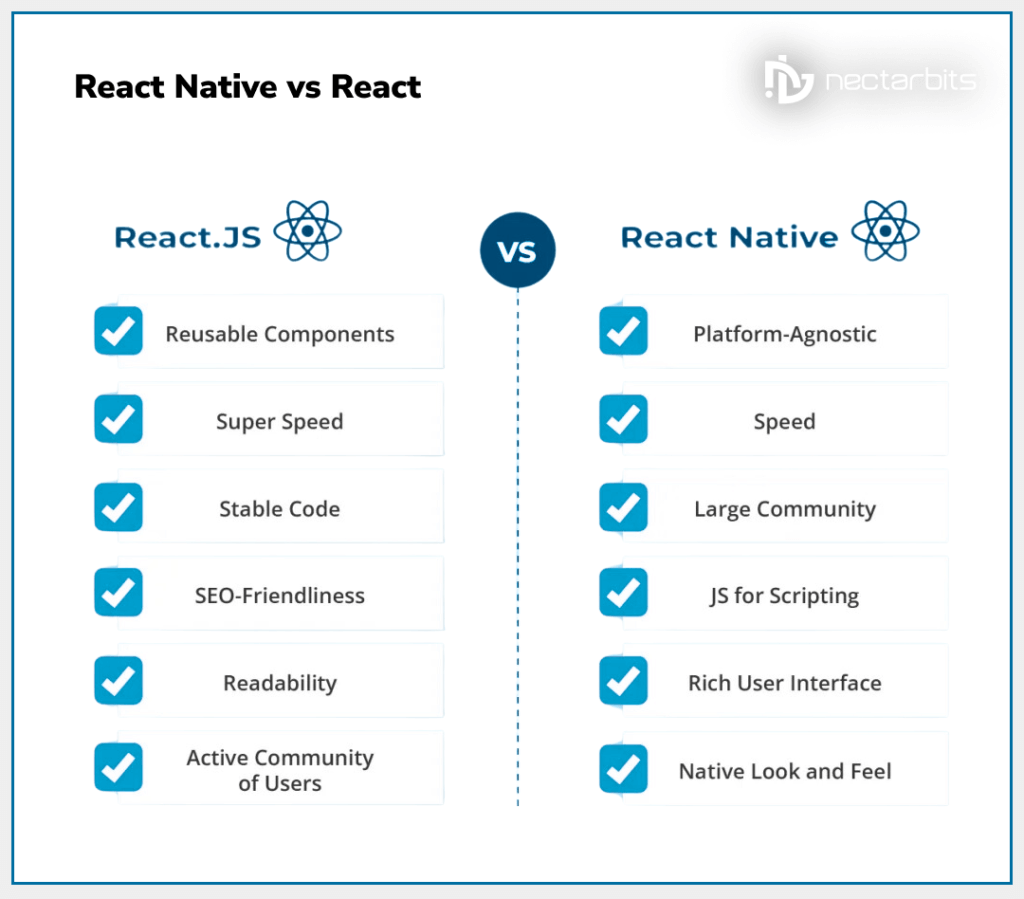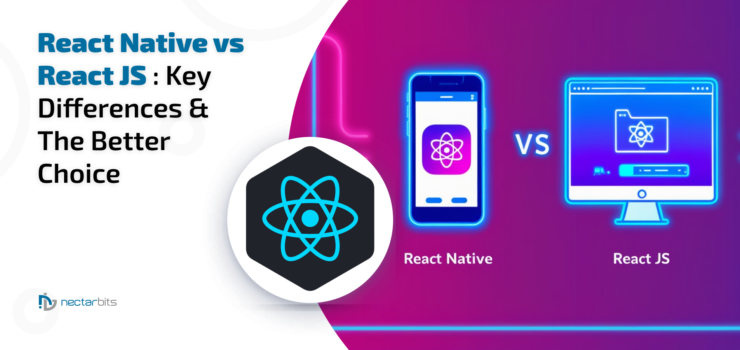With the app development industry changing so rapidly, it’s important to pick the right technology stack to ensure the success of your project. Two prevalent technologies are usually considered for this daunting task, namely React JS and React Native. In this ultimate guide, we break down the React Native vs React JS comparison and guide you in determining which is best for your development needs in 2024.
Understanding React JS and React Native
Before diving into the React Native vs React JS comparison, it’s essential to grasp what each technology offers to answer the age-old question: Which is better: React Native or React JS?
What is React JS?
React JS is an open-source JS library built by Facebook to add dynamic and responsive user interfaces for web applications. It creates reusable UI components based on a component-based architecture. React JS uses the virtual DOM, which makes rendering fast and makes performance better.
What is React Native?
Also called Facebook React Native, this framework is made by Facebook as React Native is a framework that helps developers build native mobile apps on JavaScript and React. Unlike other hybrid apps that rely on WebView, React Native components translate to native platform widgets to give you a more authentic user experience for more professional software development.
Key Differences Between React JS and React Native
Understanding the differences between React JS and React Native is pivotal in making an informed decision.

Advantages and Disadvantages
React JS
Advantages:
- SEO-Friendly: The server side renders React JS applications and hence it improves search engine visibility.
- Rich Ecosystem: React JS has a vast amount of libraries and tools to help increase development efficiency.
- Reusable Components: It helps create reusable UI components that will follow a pattern and remain consistent and maintainable.
Disadvantages:
- Learning Curve: React concepts can initially be difficult for developers new to its toolkit.
- Rapid Evolution: Developers have to stay up to date with changes required for frequent updates, which means it’s demanding.
React Native
Advantages:
- Cross-Platform Development: It makes it easy to build apps based on one single code base to work on for both iOS and Android.
- Native Performance: By rendering native components it delivers performance close to native apps.
- Hot Reloading: It lets developers see changes as soon as they are made without having to recompile the entire application.
Read More:- Is React Native App Development Right for You? A Guide to Its Pros and Cons
Disadvantages:
- Limited Third-Party Libraries: Some of the JavaScript libraries that are not compatible with React Native may help limit functionality.
- Performance Bottlenecks: If your application is using complex animations or a few heavy computations, React Native may not be at par with the performance of fully native applications.

React Native vs React JS Comparison and Pros & Cons
Consider React JS if:
- Your Target Platform is the Web: If you’re looking to use React as a React JS framework for web browsers, that would be the one for you.
- SEO is a Priority: React JS’s server-side rendering makes search engine optimization faster.
- You Require Complex Web Interfaces: Basically, it’s a splendid library to construct result-oriented and dynamic web UIs.
Read More:- Harnessing ReactJS for E-Commerce Development: A Game-Changer in 2024
When to Choose to React Native Over React JS
Opt for React Native if:
- You Need a Mobile Application: React Native is a specific specialty mobile app development React Native that is intended for developing such mobile apps on iOS and Android.
- Cross-Platform Consistency is Desired: It means that you have a unified codebase across all these platforms which is a consistency you might have always wanted.
- Rapid Development is Essential: Useful features such as hot reloading and reusable components will speed up your work in React Native.
Cost Comparison: React Native VS React JS for App Development
When deciding between React JS and React Native there is a vital need to grasp the cost implication that matters. Below are development cost comparisons, including regional rates for India, the US & UK.
| Region | React JS Development Cost (USD) | React Native Development Cost (USD) |
| India | $8 – $30 per hour | $22 – $30 per hour |
| United States | $60 – $100 per hour | $50 – $102 per hour |
| United Kingdom | $38 – $60 per hour | $36 – $75 per hour |
Note: Rates vary based on developer experience and project complexity. Updated Rates Sourced From Optymize and Aalpha.
Market Trends and Future Outlook
Today, the differences between React JS and React Native are still driving forces in their respective realms. React JS continues to be a favorite choice for web development because of its rich ecosystem and also incredible performance capably. On the other hand, React Native is the go-to for skilled mobile app development as it has acquired interest from a lot of businesses for startups and companies looking to cut down time to market with cross-platform solutions.
Conclusion
The decision in React Native vs React JS comes down to the needs of your project. If you are working with web applications with complex UI and SEO needs, then React JS is the way to go. On the other hand, if you are looking for mobile platforms and want cross-platform support with near-native performance, then React Native may be what you are looking for. Based on your project’s goals, target audience, and resource availability you will know how to make the best informed decision. For any help in reaching a decision that best suits the needs of your business in the future, you can always get a free consultation by contacting our experts at Nectarbits.
Frequently Asked Questions (FAQs)
The key difference lies in their purpose. React JS is a JavaScript library for building dynamic web applications, while React Native is a framework for creating mobile applications.
–React JS: Focuses on web development, using a virtual DOM and CSS for styling.
-React Native: Geared toward mobile apps, rendering native components and using JavaScript-based stylesheets.
Both tools serve different needs but share the foundational React principles.
It depends on your project goals:
-Choose React Native for mobile app development targeting iOS and Android with a single codebase.
-Opt for React JS if you’re building a web application with complex user interfaces.
Key Factors to Consider:
-Target platform (web vs mobile).
-Development time and budget.
-Required features and performance demands.
While React JS is primarily for web development, you can pair it with tools like React Native or Electron for mobile or desktop apps.
For mobile development:
-Use React Native for native-like performance.
-Avoid purely web-based tools if your app requires access to device hardware.
For complex mobile needs, React Native is the better choice.
Yes, but with considerations. React Native can handle large-scale apps but may face challenges with performance in resource-intensive scenarios.
Best Practices for Large Apps:
-Optimize performance for animations and computations.
-Use native modules for complex tasks.
-Leverage efficient state management libraries like Redux or MobX.
Yes, but with considerations. React Native can handle large-scale apps but may face challenges with performance in resource-intensive scenarios.
Best Practices for Large Apps:
-Optimize performance for animations and computations.
-Use native modules for complex tasks.
-Leverage efficient state management libraries like Redux or MobX.
React Native is generally cost-effective for mobile apps due to its cross-platform capability, while React JS is better for web apps.
Cost Breakdown:
-React Native: A single codebase reduces effort for multi-platform apps.
-React JS: Streamlined for web, with fewer device testing requirements.
-Hourly rates vary by region, with developers in India offering competitive pricing compared to the US or UK.
Choosing the right tool can save you money based on your project scope.








